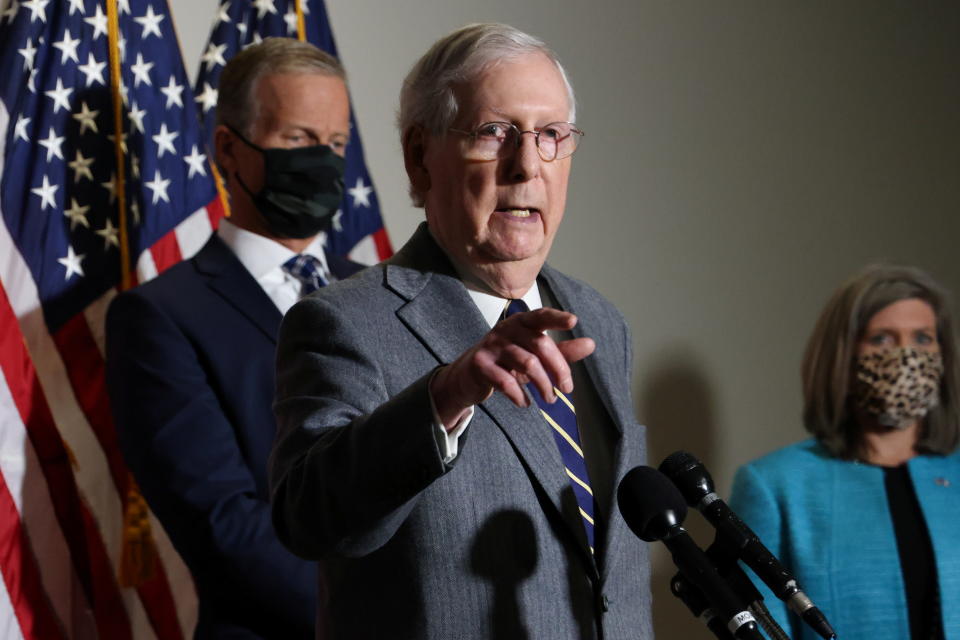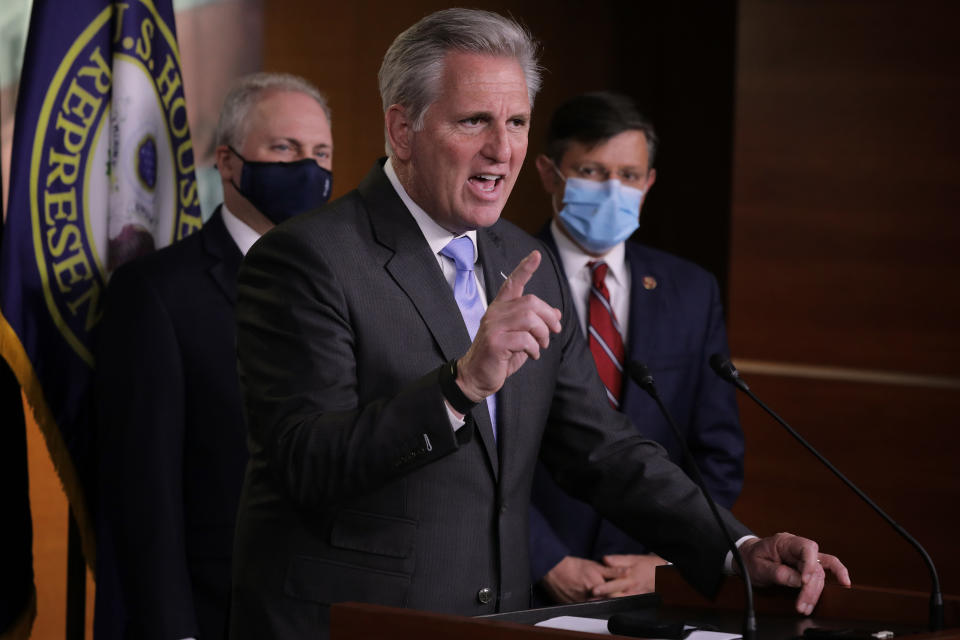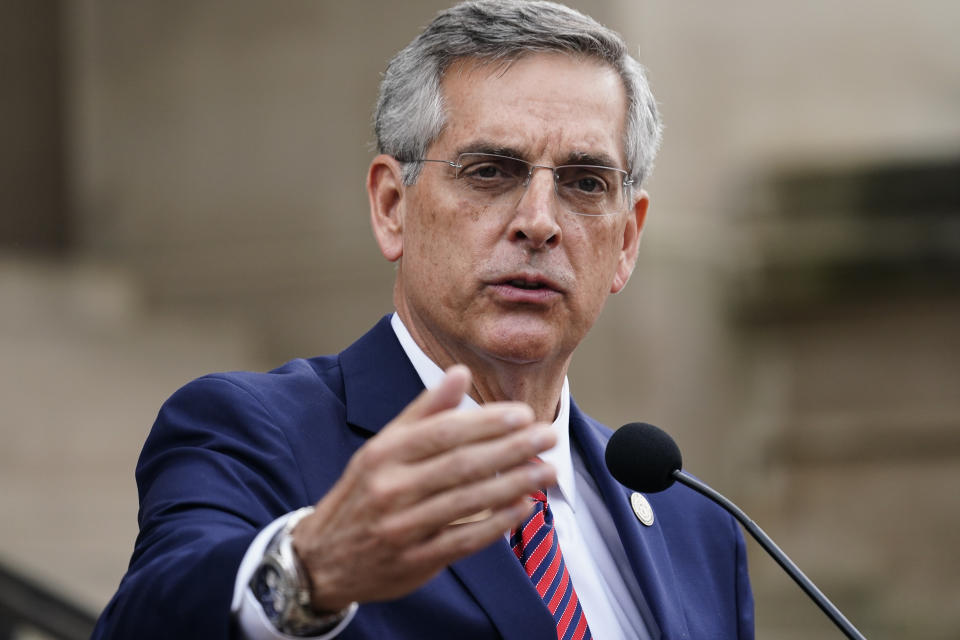Trump in exile: How he will remain a force in the GOP, and a threat to Biden's politics of unity
President Trump has spent the 10 days since he was declared the loser of the 2020 election wallowing in an alternate reality of false fraud claims and frivolous lawsuits. His refusal to engage in a normal presidential transition, supported by his allies, has left some Americans wondering whether a wounded Trump may attempt some sort of coup.
Those fears are overstated. Regardless of Trump’s freshly padded Supreme Court majority and his far-fetched Electoral College fantasies, Jan. 20, 2021, will almost certainly be his last day in office. Unless something unforeseen happens, he will leave the White House that morning, and the man who beat him by more than 5.5 million votes, Joe Biden, will be sworn in on the steps of the Capitol as America’s 46th president.
But the current president doesn’t need to seize power illegally to retain his grip on our politics. Trump just needs to keep doing exactly what he’s been doing since Nov. 3: loudly dismissing the results and denying Biden’s legitimacy, despite all the evidence that Biden won the election fair and square.
As one source close to the president told Yahoo News, Trump is “keeping his options open” at this point. Trump would, of course, applaud any Republican officials who choose to block Biden’s victory by court order or refuse to certify the count. But the anger he is fomenting among his followers could soon serve another, more plausible purpose, according to a second Trump ally who told Yahoo News the president “feels cheated” by the results: fueling a media empire or fanning the flames of a political comeback that could deform D.C. dynamics long after he’s decamped for Mar-a-Lago.
“It was so close,” the Trump ally said. “He has to run again.”

Whether or not Trump, 74, actually returns in 2024 is almost irrelevant: Simply dangling that possibility has the power to freeze Republican politics in place. It’s just one example of how easy it could be for him to keep dominating the GOP — if he dedicates himself to the cause.
The result could be a schism unlike any since the Civil War. Imagine “a counter-government, administered by tweets, propped up by Fox News or whatever alternative outlet Trump might construct for himself — a kind of Trumpian government-in-exile,” as Princeton historian Sean Wilentz has put it. By “telling his tens of millions of supporters as well as his congressional backers to reject Biden’s presidency ... Trump would be trying to establish a center of power distinct from and antagonistic to the legitimately elected national government — not formally a separate government like the Confederacy but a virtual one, operating not just out in the country but inside the government, above all in Congress.”
For that, Wilentz told Yahoo News, “there is no precedent whatsoever” in American history.
“Two things could stop Trump: either his legal troubles become so severe that he can't continue, or the Republican Party decides he’s hurting more than helping,” Wilentz added. “I wouldn’t bet on either one of these coming to pass.”
Once upon a time, Trump’s brand was luxury real estate. Now it’s 2020 denial and 2024 revenge. As long as there’s an audience for that, there will be an opportunity for him to own it — and, by extension, to own the GOP.
The question now is how Trump plays his hand.

Mainstream Washington has yet to grasp the unique threat posed by Trump’s post-presidential ambitions. Asked last week why so many “top Republicans” now “back Trump’s efforts to challenge election results,” an anonymous senior GOP official shrugged. “What is the downside for humoring him for this little bit of time?” the official mused. “No one seriously thinks the results will change. He went golfing this weekend. It’s not like he’s plotting how to prevent Joe Biden from taking power on Jan. 20. He’s tweeting about filing some lawsuits, those lawsuits will fail, then he’ll tweet some more about how the election was stolen, and then he’ll leave.”
Perhaps. But “humoring” Trump “for this little bit of time” is an optimistic way of looking at the all-too-familiar process that’s just beginning to unfold. A more realistic way of looking at it is that Republicans are lying to themselves if they think they’re just humoring Trump, and fooling themselves if they think they can stop whenever they please.
Even now, most Republicans, from Mitch McConnell on down, seem to be coming to a more cold-blooded conclusion: that parroting Trump’s denialism actually serves their own political interests, because it’s what their voters want.

“Republican officials are not scared of Trump,” Rory Cooper, a former adviser to ex-GOP House Majority Leader Eric Cantor, recently explained. “They’re scared of Trump voters, and Trump voters right now believe that there’s widespread fraud.”
As long as Trump controls his base, in other words, and as long as his base believes that Biden is illegitimate, the rest of the GOP will be incentivized to cater to that delusion.
Consider the following statistics. Despite speculation that Biden might be able to pick off disillusioned Republicans on Election Day, a full 94 percent of them voted for Trump — 6 points more than in 2016. Now, after bingeing on social-media content designed to inflate the sort of isolated, inconsequential hiccups that occur in every election into a baroque plot to overthrow their hero, 70 percent of Republicans already say the 2020 election was not “free and fair,” according to a recent Politico/Morning Consult poll; 64 percent say the results themselves (i.e., the ones that show Trump losing) are “unreliable.”
Additionally, a Reuters/Ipsos poll released Wednesday found that 52 percent of Republicans believe Trump "rightfully won" the U.S. election but that it was stolen from him by widespread voter fraud. Just 26 percent of Republicans said they thought Biden's win was "legitimate."
That’s roughly 50 million people who believe Biden may have stolen the presidency — a far broader swath of America than the thousands of easily dismissed fanatics who descended on Washington, D.C., last weekend for the so-called Million MAGA March. And they’re not just any 50 million people — they’re the same 50 million people who vote in Republican primaries.
Now consider the following developments. In the immediate aftermath of Nov. 3, four Republican senators — Utah’s Mitt Romney, Maine’s Susan Collins, Nebraska’s Ben Sasse and Alaska’s Lisa Murkowski — defied Trump and acknowledged Biden as America’s president-elect.
Since then, not a single one of their 49 GOP colleagues has joined them. On the contrary: McConnell, the Senate majority leader, said last week that “President Trump is 100 percent within his rights to look into allegations of irregularities and weigh his legal options,” while chastising Democrats for expecting Trump to “accept preliminary election results” — like John Kerry in 2004, or John McCain in 2008, or Mitt Romney in 2012, or Hillary Clinton in 2016, most of whom lost by smaller margins than Trump. Missouri Sen. Roy Blunt, a member of GOP leadership, claimed that “the president wasn’t defeated by huge numbers, in fact he may not have been defeated at all.” Secretary of State Mike Pompeo predicted that January would see “a smooth transition to a second Trump administration.” And House Minority Leader Kevin McCarthy flatly declared, “President Trump won this election.”

The poll numbers and the political posturing are not unrelated. On Jan. 5, two weeks before Inauguration Day, Georgia will hold dual runoff elections for the U.S. Senate. If Democrats win both, they will control the upper chamber; if they don’t, they won’t. To preserve McConnell’s majority and his power to block Biden’s agenda, Republicans need to turn out as many of the 2.46 million Georgians who just voted for Trump as they possibly can.
And that, according to a New York Times report, is already “driving” the GOP’s “calculations about how to handle the election results,” leaving “Republican leaders … reluctant to make any move that might alienate Mr. Trump’s loyal supporters and hurt their candidates’ chances.”
“The Republican Party is the party of Trump — without him, they’re nothing,” one Democratic operative working in Georgia told Yahoo News. “They 100 percent need him if they want any chance at surviving this special election, and they’ll do anything to stay on his good side, even if that means swallowing his load of lies.”
To get a sense of how accommodating Republicans have become, look no further than the two GOP senators competing in the Georgia runoffs. Last week they publicly claimed — without a shred of evidence — that Georgia Secretary of State Brad Raffensperger had “failed the people of Georgia” in his administration of the election and demanded his resignation. Later, leading Trump loyalist Sen. Lindsey Graham of South Carolina phoned Raffensperger and “appeared to suggest that he find a way to toss legally cast ballots,” according to a Washington Post interview with Raffensperger himself. Graham admits speaking to Raffensperger — which would be unusual enough in itself — but denied he sought to persuade him to tinker with the results.

Raffensperger described himself to Yahoo News as “a Republican through and through” who donated to Trump’s campaigns — but insisted on defending the integrity of his state’s election process.
Maybe things will settle down after the Georgia recount and runoffs. But maybe not. Biden’s presidency will bring with it constant partisan showdowns — battles over COVID-19 relief and the debt ceiling and the courts that will continue to make Republican leaders “reluctant” to “alienate Mr. Trump’s loyal supporters,” as the Times put it. Before long the 2022 midterms will be upon us, with 21 Republican Senate seats at stake.
The only way the GOP can stop this charade is if their voters stop subscribing to it. And the only way their voters will stop subscribing to it is if Trump stops selling it — something he has hundreds of millions of reasons not to do.

In September, the New York Times published an extensive investigation into Trump’s personal finances. Its biggest revelation was that the former president will have to pay back more than $300 million in loans over the next four years. At the time, Trump’s longtime former personal attorney and fixer Michael Cohen told Yahoo News that facing these gargantuan bills was one of his old boss’s “biggest fear[s].”
The Times exposé also contained another eye-popping takeaway: Trump reaped more than $400 million from his reality television show “The Apprentice” and “the licensing and endorsement deals that flowed from his expanding celebrity” — a nine-figure payday that far exceeded his earnings from the operations of his namesake organization.
It’s no wonder, then, that Trump reportedly wants to return to the only business that seems to have delivered profits large enough to offset his massive liabilities. According to Axios, the president “has told friends he wants to start a digital media company to clobber Fox News”; others in Trump’s orbit are whispering about plans to potentially acquire or partner with the staunchly pro-Trump outlet Newsmax, which already boasts a precious spot on the cable dial in addition to a robust website. Either way, any Trump media effort would seek to perpetuate and profit from a dangerous lie: that Biden stole the presidency and robbed Trump and his followers of what is rightfully theirs.

Trump’s behind-the-scenes political maneuverings already point in the same direction. Since Biden’s win, Trump supporters have been bombarded with fundraising appeals encouraging them to donate to the “OFFICIAL ELECTION DEFENSE FUND” — ostensibly an effort to mount legal challenges and “make sure we have the resources to protect the integrity of the Election.” Yet the voluminous fine print tells a different story. Sixty percent of each donation goes “first” to Save America, a leadership PAC that Trump established on Nov. 9. He could use the PAC to raise cash for other candidates and preserve his influence within the party, but leadership committees are also sometimes seen as a precursor to a presidential campaign — something Trump is “seriously” considering and has “100 percent” mentioned in conversations with his top advisers in recent days, a Trump campaign senior adviser and a Trump ally told CBS News on Tuesday. Save America did not respond to requests for comment.
Meanwhile, the remaining 40 percent of any donation is split between a “recount account” and “general election debt retirement until such debt is retired.” This means that only a portion of Trump’s “election defense fund” will go to actual “election defense.” The rest will be used to pay off debt and finance his political future. The Trump campaign did not respond to questions about his plans or how much debt his presidential campaign accrued.
Either way, the Republican base is now Trump’s most valuable asset; he has no reason to relinquish it anytime soon. As a result, the GOP can’t move on — can’t reckon with its loss, can’t reform its approach, can’t even focus on anything else.
As if to prove this point, not one of the party’s next-generation presidential wannabes — Florida Sen. Marco Rubio, Arkansas Sen. Tom Cotton, former United Nations Ambassador Nikki Haley — has dismissed Trump’s baseless claims or challenged his “leadership” in any way since the election.
“When you look at the number of votes that he got, you look at the kind of enthusiasm that he engenders, I mean — he’s going to be a very, very significant figure whether he’s in the White House or not,” explained Sen. Josh Hawley, R-Mo., who is believed to harbor his own presidential ambitions. “I don’t know who else would be considered the leader, if not for him.”

What happens next will depend on Trump. Millions of Americans remain under his spell. Elected Republicans will continue to capitulate to these diehards as if their political lives depend on it — because for now, at least, they do.
In theory, it’s still possible that Trump will stand down after the states certify their results and his half-hearted legal challenges fall short. “Closing out this election will be a hard but necessary step toward restoring some unity and political equilibrium,” Karl Rove, the architect of George W. Bush's presidency and an informal Trump adviser, wrote last week in a Wall Street Journal op-ed titled “This Election Result Won’t Be Overturned.” “Once his days in court are over, the President should do his part to unite the country by leading a peaceful transition and letting grievances go.”
Trump has shown no ability to unite the country and no proclivity to let go of grievances. But perhaps he will sulk off and ultimately decide he’d rather spend his remaining days playing golf than waging political jihad. In his absence, passions could cool and Washington may revert to its standard level of crippling dysfunction.

Another possibility is that Trump, mired in debt, refuses to concede and continues to insist “I won the Election!” on whatever profit-oriented platform he embraces. Yet without the intoxicating aura of presidential power — and perhaps with Rupert Murdoch’s empire arrayed against him — he finds it harder and harder to sustain his followers’ devotion, eventually spiraling into the kind of irrelevancy that has engulfed former Alaska Gov. Sarah Palin, who recently made headlines for wearing a pink and purple bear costume on the Fox reality show “The Masked Singer.”
The legal challenges awaiting Trump once he’s no longer protected by presidential immunity could hasten this loss of luster. They include two defamation suits brought by women who have accused him of sexual assault; one fraud and civil conspiracy suit brought by his niece Mary Trump, who says the Trump family cheated her out of an inheritance; one suit brought by a group of working-class plaintiffs who are suing Trump and his three oldest children for enticing them to invest in an alleged pyramid scheme; and two New York investigations into possible financial chicanery by the Trump Organization, likely including tax fraud, insurance fraud and falsification of business records. However these cases play out, they could consume Trump’s time, energy and resources — and damage whatever remains of his brand — in years to come.
Biden’s Justice Department could also pursue criminal investigations into Trump’s business affairs or abuses of presidential power that Democrats have alleged during his term — although Biden himself said he would keep hands off such decisions.
Still, no one should doubt Trump’s ability to wriggle out of legal jeopardy or to go wherever the money leads. He could attempt to shield himself from federal charges with a preemptive presidential pardon; even flirting with a 2024 campaign could help insulate him by recasting potential indictments as partisan attacks.
And despite a warning Tuesday from Jack Dorsey, Twitter’s chief executive, that the company will no longer make policy exceptions for Trump after he leaves office, losing reelection has so far not “cost [Trump] one iota of social-media stardom”; instead, he has gained more than 1.5 million followers since Election Day. Sure, the mainstream press might pay less attention to ex-President Trump. But his online influence is likely to persist. One recent study found that Trump and 20 of his high-profile supporters were the source of 20 percent of retweets of election misinformation; another found that Trump himself was “the largest driver” of coronavirus misinformation.
However he manages to maintain it, Trump’s continued sway over the GOP could make the obstruction that Barack Obama faced as president look like “Kumbaya” compared with what Biden is about to encounter.

Already the president-elect is being denied access to the kind of security briefings and pandemic plans that would typically ensure continuity of government — a situation that those around Biden have likened to the delayed transition after the contentious 2000 election, which left America vulnerable on 9/11. A Trump appointee at the General Services Administration has declined to issue the standard “ascertainment” of results that would free up funds and secure facilities for Biden’s transition team. On Saturday, MAGA demonstrators clashed with counterprotesters on the streets of Washington. And pro-Trump truck drivers are now talking about a protest strike, potentially slowing commerce and damaging the economy.
“As of now, the word is Nov. 29 … we park them, but we don’t move,” one trucker declared in a video posted to social media. “Nov. 29 is the day we take this country back. … It’s our time. We say what happens.”
These disruptions could hinder America’s fight against the pandemic — and not just because vaccine distribution will eventually require refrigerated trucks. “We’re in the middle of a war, and we don’t know who the general is going to be,” Gov. Larry Hogan of Maryland, a Republican, said earlier this week. “We don’t know what the game plan is. And we can’t wait until the end of January.”
Or as Biden himself warned Monday, “more people may die if we don’t coordinate.”
Going forward, Washington could struggle to fulfill even it most basic duties if Trump decides to devote his enormous post-presidential platform to deluding tens of millions of Americans into rejecting the legitimacy of Biden’s presidency and the election that produced it — and if Republican media and politicians decide to treat Biden as illegitimate in response.
“I think [Biden] would have to do a lot to convince Republicans that [his presidency] is anything except a left-wing power grab financed by people like George Soros, deeply laid in at the local level,” former House Speaker Newt Gingrich, who helped invent and nurture Washington’s atmosphere of polarization, recently predicted. “It’s very hard for me to understand how we’re going to work together.”
_____
Read more from Yahoo News:


